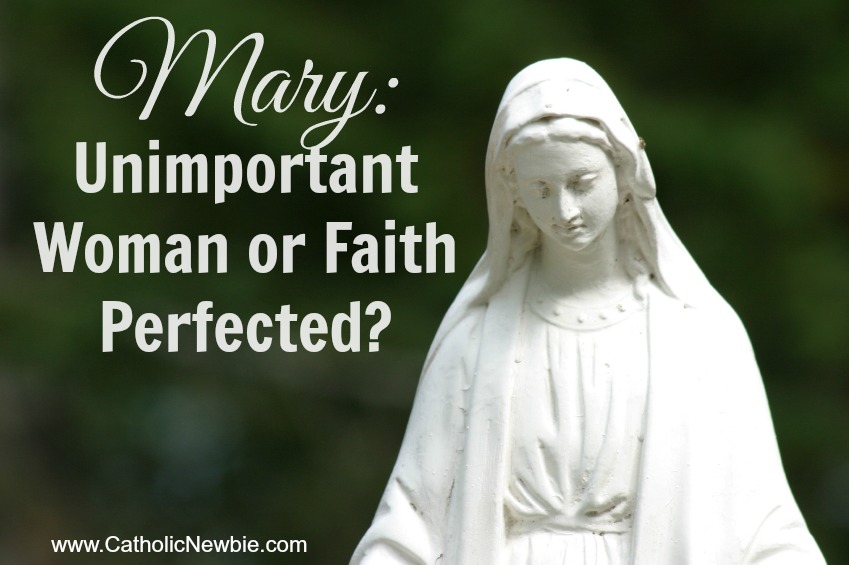Mary: Unimportant Woman or Faith Perfected?

To those outside of Catholicism, Mary is an enigma. Yes, she gave birth to and raised Jesus but her role beyond those duties is not explored in any depth and sometimes dismissed over confusion about different passages referring to her in the New Testament that are seemingly dismissive.
I could talk about Mary for centuries and never be done :), but in this post I want to explore what I have found to be one of her most important roles in salvation history: God’s model of ultimate faith. And I’ll show you why.
But first, I want to explore some reasons why I’ve heard from others that Mary is, instead, unimportant:
1) God “tells” Mary she will conceive Jesus; it’s not a choice for her to accept or reject, even though she assents.
2) Jesus calls her “woman” multiple times not “mother”; therefore, he is dismissing her importance.
3) Jesus is the only intercessor between us and God; we should not pray to Mary.
4) She is rarely mentioned in the New Testament.
Now I want to address why I believe Mary is God’s example to us of how have perfect faith, which will dispel many of the above.
Abraham & Mary
I am currently reading the Bible all the way through (beginning Jan. 1) using a great Bible reading plan from the Coming Home Network. I highly recommend reading it all the way through, as in the previous post about the book EVERY Catholic should read by John Bergsma, you truly cannot understand the New Testament or Old Testament alone. They must be looked at together to truly see what God is telling us.
I had never made any parallel between Abraham and Mary, have you? But Fr. Michael Gaitley in his book “33 Days to Merciful Love: A Do-It-Yourself Retreat,” compares the two in faith — and amazingly so. Abraham is our “Father in Faith” because he believed what God said to him even when it seemed impossible.
God told Abraham he would make his descendants as numerous as the stars, yet he asked Abraham to sacrifice Isaac, the one through whom God had promised to make of Abraham a great nation. How could he have descendants and be the forefather of a great nation if his son was dead? Yet he proceeded. Hebrews 11:19 says “He considered God was able to raise men even from the dead.” Now, THAT is faith.
Mary, too, was asked to watch as her only son was given up to death. Fr. Gaitley says, “…while Abraham ultimately did not have to go through with the sacrifice, Mary had to watch and be present during the torture and slaughter of her dearly beloved son all the way to its agonizing end” (p. 36, Day 5). Do you think she was wondering how what the angel Gabriel told her — that her Son would “reign over the house of Jacob forever and of his kingdom there would be no end” — could possibly come true now?
Yet, she never lost her faith, and because she saw the act to its completion, where Abraham did not, she perfected faith for us. The New Testament is so much about the perfect fulfillment of the things of the Old Testament and Mary is just one more example.
Supportive Scripture
Though Mary’s mentions are few in the New Testament (St. Louis de Monfort tells us this is by her humble request of God), she is over and over again associated with “faith” when she IS mentioned.
The Annunciation
At the annunciation, the angel Gabriel calls Mary “full of grace,” using a word that means blessed but that is uniquely used only to describe Mary (showing us that she is entirely set apart for God in a unique way) and says God is with her. Also, if you are “full” of something, there is no room for anything else; if she is full of grace, there is no room for sin, thus, her Immaculate Conception.
While the Angel does not ask for her assent, Luke records it as “Behold, I am the handmaid of the Lord; let it be to me according to your word.” Why record her assent if it is not important? If God didn’t need it? Don’t we have free will? Mary’s cooperation here is crucial; she undoes the knot of Eve’s lack of cooperation with God, which stemmed from Eve’s lack of belief in what God told her. Mary DOES believe and she is held as an example for it as we’ll see below.
Also, in an earlier passage in Luke, Zechariah is also visited by the angel Gabriel and told his wife Elizabeth, who was barren, will conceive John the Baptist. Zechariah DOES NOT believe and has his voice taken away as a result. The two stories parallel each other in such a way as to show us what true faith looks like.
Elizabeth’s Blessing
Inspired by the Holy Spirit (that means the triune God is speaking!), Elizabeth declares Mary is blessed for believing that “what was spoken to you by the Lord would be fulfilled.” She is “blessed” declares the Holy Spirit specifically for this reason! Sidenote: the Holy Spirit, through Elizabeth, also names her as “the Mother of My Lord” here; thus, the title Mother of God (“Lord” in this passage clearly refers to the Father, not the Son).
Jesus to the Woman in the Crowd
This is a verse that many take to be dismissive of Mary, but give it a second look.
“While he was speaking, a woman from the crowd called out and said to him, ‘Blessed is the womb that carried you and the breasts at which you nursed.’ He replied, ‘Rather, blessed are those who hear the word of God and observe it.'” (Luke 11: 27-28)
Do you see the blessing? Do you see how Jesus is revealing Mary as the ultimate believer, with full trust and faith in God? Jesus says Mary is not blessed because she is his mother; rather, He turns it back to her. She is blessed because she listened and had faith in God.
Your Mother and Your Brothers
Here’s another that is taken to be dismissive of Mary, but again, I ask you to look at it with fresh eyes:
“He was told, ‘Your mother and your brothers are standing outside and wish to see you.’ He said to them in reply ‘My mother and my brothers are those who hear the word of God and act on it.'” (Luke 8:20-21)
Why would Luke include this verse? Is it necessary that we read a seemingly unimportant moment of Jesus’ family asking to see him? No. Would Jesus be saying that Mary was not his mother? No. He would be breaking one of the Ten Commandments by not honoring his mother.
Rather Luke is reminding us of what Jesus wants to show us about Mary. Again here, Jesus says that Mary and His brethren (cousins/family) are not important because they are related to Him, but because they “heard” the word of God (listened, trusted and had faith) and were obedient to His will.
The Wedding Feast at Cana: “Woman”
Here, Jesus and Mary (the new Adam and the New Eve, not coincidentally presented at a “wedding”) attend a wedding and the bride and groom run out of wine. Mary states to Jesus, “They have no wine.” (John 2:3) (Mary also gives us a clue here about praying to Jesus: State your request and then let go and give it up to Him.)
“And Jesus said to her, ‘Woman, how does your concern affect me? My hour has not yet come.'” (John 2:4)
First of all, “woman” presents Mary as the New Eve and refers back to Genesis 3:15 that says “I will put enmity between you and the woman, and between your offspring and hers; They will strike at your head, while you strike at their heel.'” Mary is this woman and Jesus is her offspring; by cooperating with her Son, together they will defeat Satan. “Woman” is not meant as a derogatory term for Mary (again, would Jesus dishonor his mother?).
Second, Jesus refers to “his hour”. In John 12:23 Jesus says His hour has come, referring to His crucifixion and Resurrection. So we know that is also what He is referring to in the Cana passage. While you can make your own interpretation of this passage, I agree with experts who say Jesus essentially means: Mom, are you really ready to embark down this difficult journey that will result in my death? Once we begin, there is no turning back.
Because guess what he does? He honors his mom’s request. Thus, she spurs the beginning of his ministry and of his road to the Crucifixion. But Mary humbly leaves it up to Jesus, saying to the servers: “Do whatever he tells you.” Again, though, she has faith in God and Jesus. If it’s meant to be addressed, He will address it; if not, He will not. But she does not insert her own will into the matter beyond making the request.
This also is part of the reason why we pray to Mary. She looks after our earthly concerns, even as seemingly insignificant as running out of wine (though this would have been highly embarrassing for the married couple at the time), presenting them to her son. And when your mom asks you to do something, it has a bit more weight than anyone else. Plus, as we see in the Genesis passage, Mary cooperates with her Son in our salvation and the defeat of Satan. Mary also represents the queen mothers of the Old Testament who presented requests to their sons, the Kings, to have them granted. So many layers…
The Thread of Faith
Do you see the thread of faith weaving through all these passages about Mary? If you are struggling with complete faith or trust in God, ask Our Mother to help you. Ask her to allow you to see her son through her eyes of faith and trust. Ask her to increase your faith and trust in God.
Mary is not an intercessor for God; she only wants to bring us to her son and bring our requests to Him, as well. Doesn’t it make sense that God came to be in our midst through Mary and so going through Mary would be a way to reach God? And she is a gentle and loving mother, who lived as a human being here on earth just like we do. If she can do it, so can we. We just need to ask for help.
Blessed Mary, Ever Virgin, Mother of Mercy, Pray for Us! Amen.



